Women’s World Cup 2023: Morocco and the women’s football revolution funded by a king
- Published
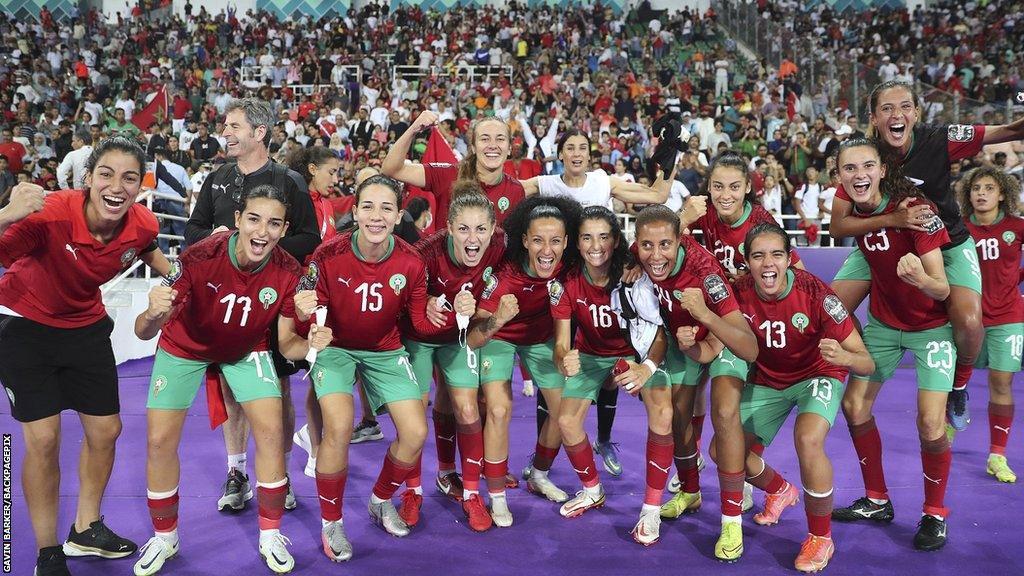
The Atlas Lionesses qualified for the World Cup by finishing as runners-up at last year's Women's Africa Cup of Nations in Morocco
"Morocco was a land of men's football and it had to be for women too."
Reynald Pedros is the coach who will lead Morocco's women at their first ever World Cup in Australia and New Zealand. Having already made history, he knows better than most that these are heady days for the country's football fans - both male and female.
In December, Morocco's men, nicknamed the Atlas Lions, made history in Qatar by becoming the first African and Arab nation to reach a World Cup semi-final.
Olympic qualification for next year's Games in Paris has also just been secured thanks to victory in the Under-23 Africa Cup of Nations (Afcon).
But recent investment that has helped fuel those achievements in the men's game is also allowing the nation's women to flourish, having booked their place at the World Cup by finishing as runners-up at last year's Women's Afcon, a best ever performance in the competition.
So why are the Atlas Lionesses roaring louder than ever before?
How Morocco's investment in women's football is paying off
Facilities fit for a king
In 2009, King Mohammed VI opened Morocco's new football academy just outside the city of Sale. The first building block of a long-term plan backed and funded by the king, the idea was to produce young players - boys and girls - capable of reshaping Moroccan football and its image as a sport for both sexes.
The initial focus on the grassroots also included building hundreds of top-quality pitches all over the country, but the crowning infrastructure glory arrived in 2019 when King Mohammed, a keen football fan, opened another facility bearing his name: the King Mohammed VI Training Complex near the capital city, Rabat.
Home to both the men's and women's international teams at senior and junior level, the $65m centre boasts among its amenities eight full-size pitches, futsal and beach pitches, gym and medical facilities, an Olympic-sized swimming pool, classrooms and a 5-star hotel.
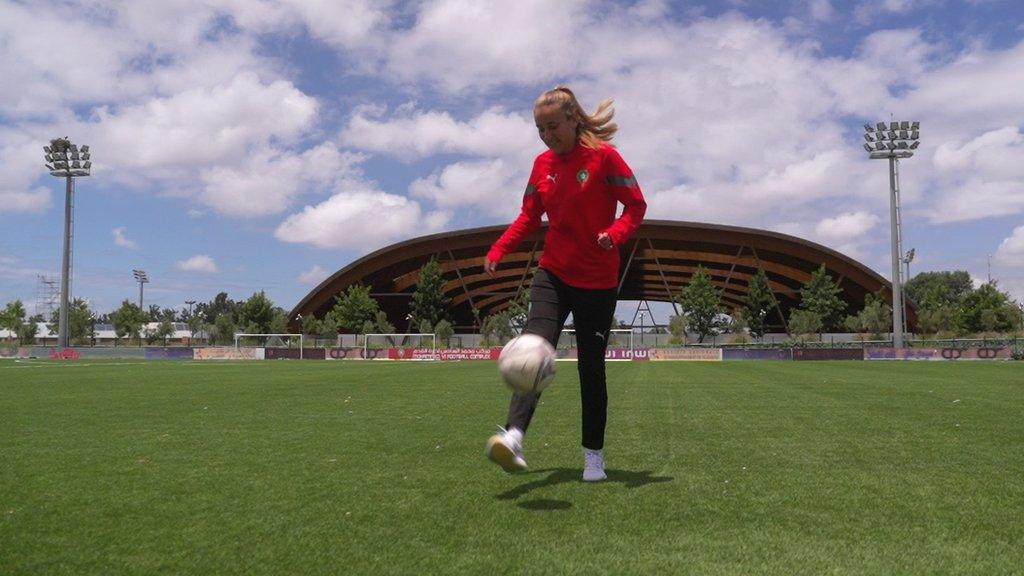
Defender Yasmin Mrabet says training at the $65m King Mohammed VI Training Complex allows Morocco's women to truly feel like professional players
"You couldn't ask for anything more. Here, I really do feel like a professional football player," Morocco defender Yasmin Mrabet tells BBC Sport Africa on its visit to the complex ahead of the World Cup.
"The investment the federation has done in the last couple of years, in women's football especially, has been incredible. You can clearly see the results."
You can indeed.
Ahead of hosting last year's Women's Africa Cup of Nations (Wafcon) for the first time, Morocco had only qualified for the tournament twice (1998 and 2000), winning just one of six games while scoring five goals and conceding 22. On their own turf, they made the final, losing 2-1 to South Africa in front of a sell-out crowd of 51,000 fans.
"We were surprised by this large audience that grew after each game," says captain and star player Ghizlane Chebbak, whose father Larbi was part of Morocco's only Afcon-winning side in 1976.
"We started playing with a lot of emotion. It is our duty to set an example," adds the 32-year-old after a morning training session.
"There was serious work and we started to reap the results. We are lucky to be part of this generation."
Her national team coach, Pedros, is in agreement that the efforts of those off the pitch have played a key role in advancing what he describes as "the will of the king".
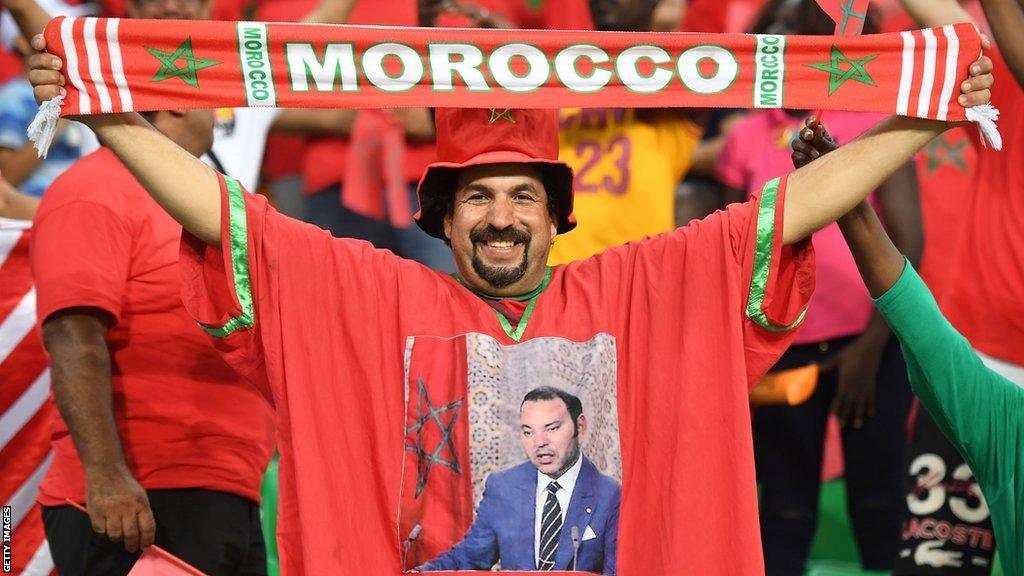
Some Moroccan football fans are also big fans of King Mohammed VI, with the king's investment over the last decade having boosted the game around the country
"I believe if we did not have the support of the federation we would not succeed," concludes the Frenchman who was recruited by the Royal Moroccan Football Federation (FRMF) in December 2020 after winning two European Champions League titles with Lyon.
"In Europe it (investment) started long ago, but Morocco is one of the only African countries that invests so much in women's football.
"The moment you believe in what you do, you give this torch to others."
A professional league of their own
The investment has not only gone into infrastructure and elite coaches from overseas.
In August 2020, the FRMF signed a deal with the existing National Women's League to make the competition professional. It also announced plans for a national under-17 championship and regional youth competitions for girls.
The drive behind the project was not just about creating elite footballers for the future - this was also a form of social engineering in a Muslim country with traditional values.
"Our objective is to develop women's football and spread its practice in all the regions of the kingdom," said FRMF president Fouzi Lekjaa at the time, as he announced plans to increase the number of Moroccan women playing football, external to 90,000 by 2024 as well as training 10,000 female executives to help run the various new clubs and competitions.
To achieve these aims, the annual budget for women's football rose to $65m - a tenfold increase.
"It was not easy in the past to have a lady playing football," Moad Oukacha, president of Sporting Club Casablanca, tells BBC Sport Africa.
"Today, it is very easy. You see the parents coming with them, they push the ladies, they negotiate with the school to get slots for extra training.
"There is a social impact that we see clearly in all Morocco."
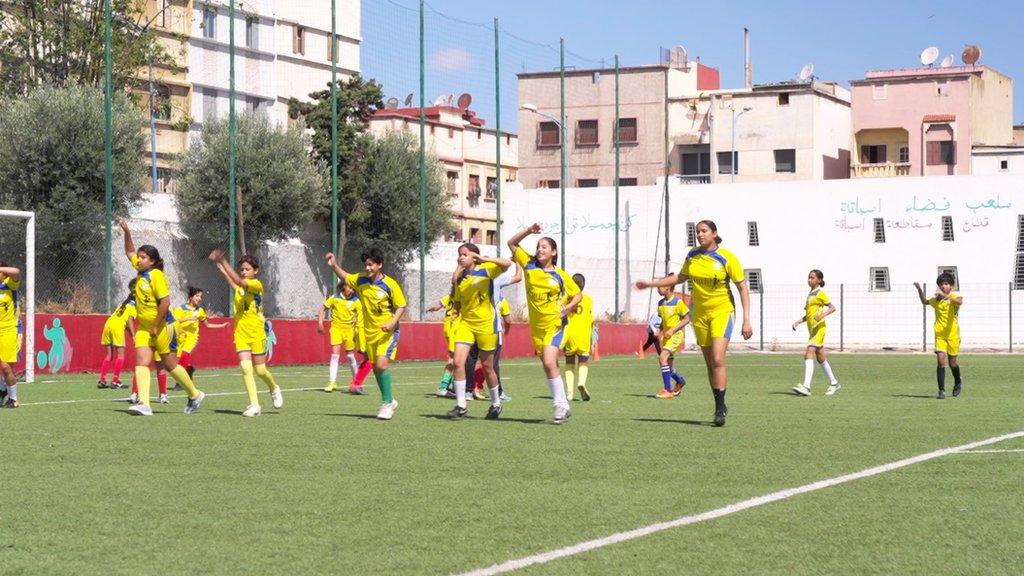
Sporting Club Casablanca puts a firm focus on junior football, with under-17, under-15 and under-13 teams for girls
Formed four years ago, Casablanca began life in Morocco's third tier. Last year, the club finished second in the top flight, qualifying for the African Champions League, a competition won last season by Morocco's AS FAR.
Like every team in the first division, Casablanca receive an annual allowance of $120,000 to go towards salary costs, something that has allowed them to recruit players from Burkina Faso, Ivory Coast, Mali and Nigeria.
Oukacha says the new-found professionalism is driving up standards.
"You need to have a strong, strong championship inside the country. (The clubs) will feed automatically our national team to make it the best in Africa and one of the best in the world."
'The woman must stay home'
While progress has been made, it seems not everyone has moved away from the view that football is for men, not women.
"It hasn't gone completely," says Mrabet when asked about the traditional mindset.
"I think all of women's football is still living the situation."
According to 14-year-old Rim, an impressively mature junior player with Casablanca, a girl's opportunities can still be dependent on parental approval.
"I grew up with a family that loves sports. My mother is a swim coach and my father is a weightlifting coach for people with special needs," she explains.
"Most people do not accept that the woman plays football too, because the woman must stay home to look after the children, be an exemplary mother and a good wife.
"I see the contrary, the woman can do many things, can develop many areas through football."
The hope is that Morocco's maiden World Cup appearance will continue to break down stubbornly persistent barriers.
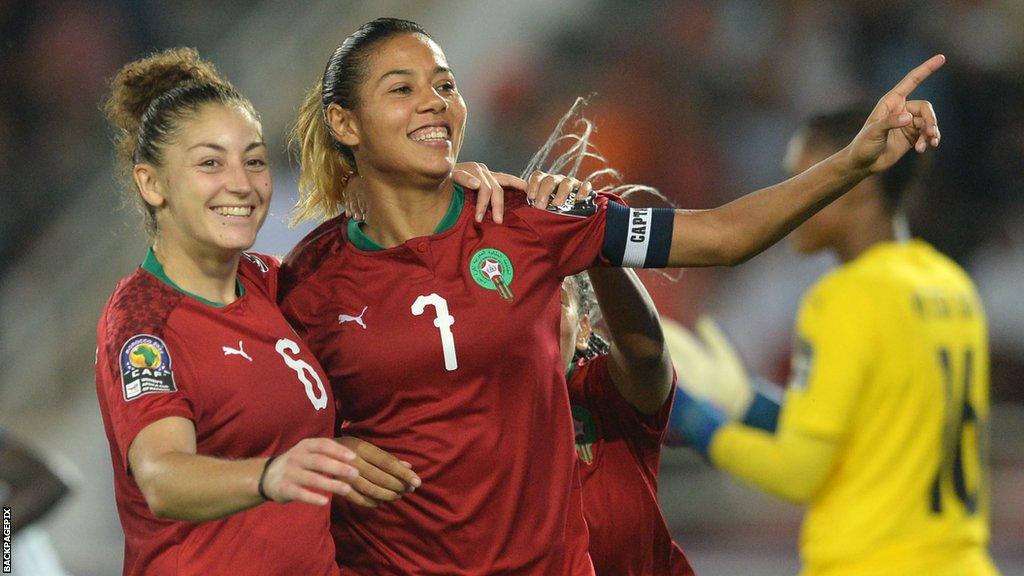
Morocco captain Ghizlane Chebbak (right) will lead her country at their first ever World Cup in Australia and New Zealand
"This is the goal of our work," says Chebbak, "to show that even in Morocco, as a Muslim and conservative country, we have the necessary openness and communicate the values we want."
As the main figurehead for the women's football revolution, Morocco's record goalscorer sees her name as an identifiable symbol of success.
"Today, the girls are wearing Chebbak shirts and think one day they will play with their names. This is the thing that makes me happy and makes me have a great responsibility to work more."
Like her captain, Mrabet believes a change is already evident.
"I see so many girls playing football…on the street and on the beaches."
And she has a message for those who remain doubtful.
"What I'm achieving here in Morocco is for something bigger than just football.
"We want to get big and we're not stopping."